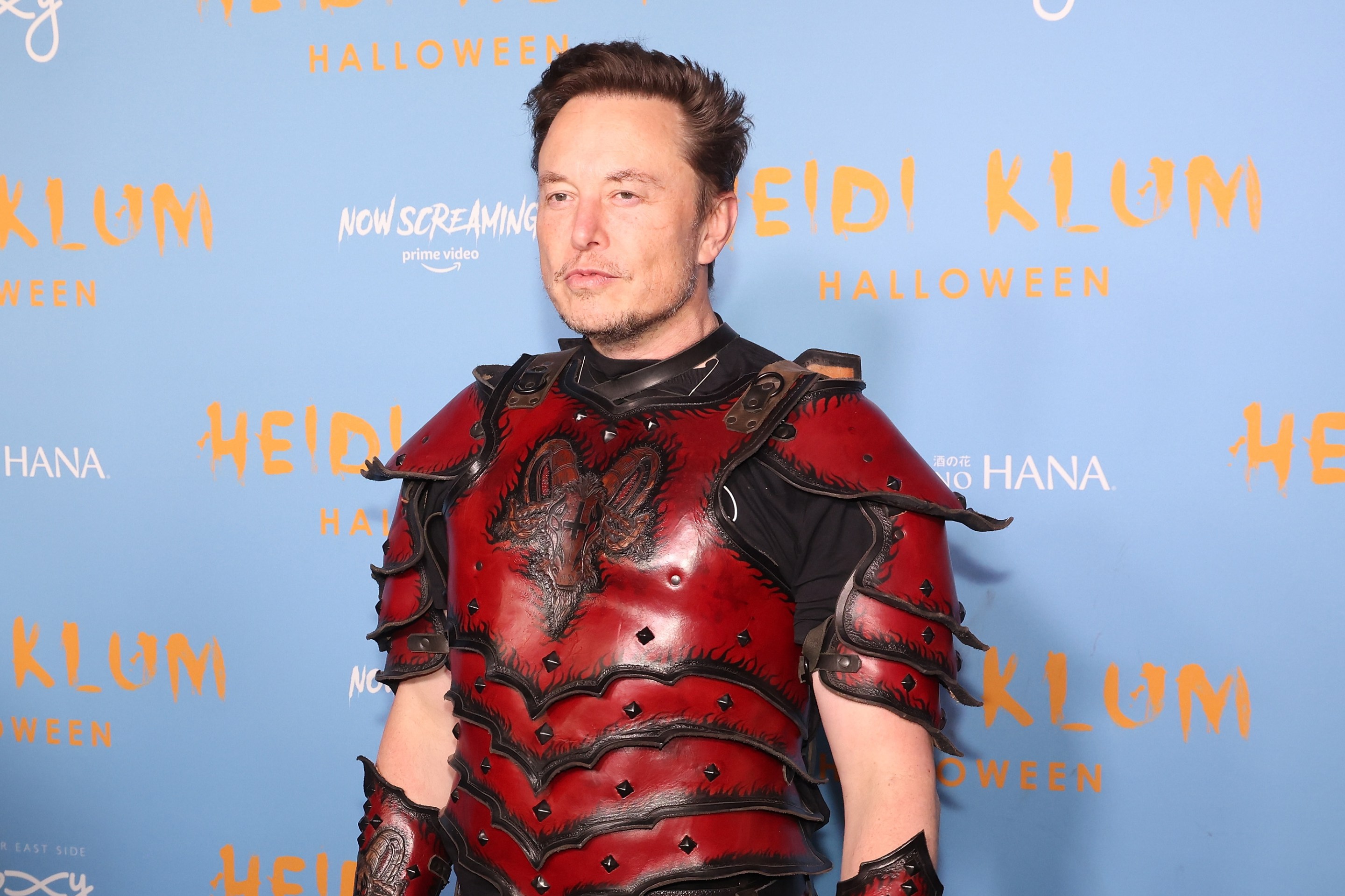The morning after The New York Times did its best to map the unplaceable, idiosyncratic, neither-left-nor-right politics of the world's richest man last weekend, that man got on the social media platform he owns and posted "my pronouns are Prosecute/Fauci." If you had only read that Times story, which noted that Musk, "ever a bundle of contradictions and inconsistencies, has long made his politics tricky to pin down," while also mentioning that his "recent tweets have had that kind of 'own the libs' tone, the shorthand on the right for when conservatives think they’ve deftly, often sarcastically, swatted down a liberal," you might look at Musk's tweet and see a very rich man who "has called himself an independent and a centrist, yet 'economically right of center, maybe'" who was also maybe having a stroke.
This was the sort of arch Times explainer that is rich in subtextual signaling for those in the know, but also written in the sort of stilted tone you might use to describe Lil Uzi Vert's music to an elderly relative. If you are familiar with this type of Times story, you would recognize it as the sort of thing they write about a weird public idiot when he has been acting especially like a weird idiot of late. Musk's post—and many if not most of his posts—was plainly incomprehensible to anyone not sufficiently up on the tidal patterns of Twitter discourse and the irreversible erosive effect they have had on Musk's brain. But it is, like most such bits of reactionary dada, a tone that you hear more than it is a text that you read.
Someone unfamiliar with all that might correctly adduce that the "my pronouns" bit has to do with the reactionary campaign against trans and nonbinary people, which has become a favorite topic of Musk's cohort of renegade free-thinkers; they have adopted this particular wan gag as their signal and indeed only joke. Such a reader might well wonder what any of that has to do with COVID-19 or the recently retired figurehead of the (also recently retired) federal response to the pandemic. Even by the miserable standards of mushing-two-recognizable-things-into-one gags that has long defined Twitter's Mendoza Line, it only barely scans as a joke. It's Left Shark saying "Covfefe," or a meme of Jennifer Coolidge in The White Lotus with the words BEAN WIFE over it in Impact font. It is, as the worst posts tend to be, not just embarrassing but somehow implicating to read.
In the ways in which Musk's post is topical, it absolutely sucks ass; it's strident and stupid and unfinished, a very low-impact and low-energy entry all around. In every other sense, from basic effort to basic craft, it is equally embarrassing. As such, it is very much in keeping with Musk's personal posting style, which has in recent months come to resemble that of an AI bot that had been fed only the nouns from Glenn Greenwald's posts.
The woke mind virus is either defeated or nothing else matters
— Elon Musk (@elonmusk) December 12, 2022
There are many such posts out there, because this sort of thing—signals of distress that toggle between thundering proclamations of Total War and a sort of sweaty gloating—is more or less the sound that older conservatives and the people who make their living pandering to older conservatives make. There isn't a political program to speak of, beyond some dire retributive fantasies—prosecutions, tribunals, prison camps, political murder, normal shit—buffered with ROFL emojis and opaque in-group jargon. It is not important, or anyway not very interesting, how serious these people are about this. Given how heatedly they fantasize about it in public, they surely wouldn't have any problem with mass violence against their enemies, although they'd prefer someone do it for them. But also there is not a great deal of thought evident in it. When you hear a bunch of dogs barking, you wouldn't assume that they're having a conversation. They're just doing what their buddies are doing.
Online reactionary politics is a fan community before it is anything else; as with Donald Trump, the way to tell that Musk is an active participant is how obviously starstruck he is by the corny dingbats that make up its firmament. Where Trump lived for the approval of Fox News's glitching poreless on-air goblins, Musk has been queasily quick with an "exactly" in the mentions of various reactionary influencers: the anti-trans activist that solicits bomb threats to children's hospitals, or the one fellow from the Koch-backed Turning Point USA organization whose face seems to be shrinking, or Cat Turd 2. If it is embarrassing to know who these people are—and it is extremely embarrassing to know who those people are—it is more embarrassing still to have mistaken these relentlessly self-serving grifters for friends.
What all of that decidedly is not, however, is mysterious. Musk's politics, however heterodox he himself might secretly be, appear very much to be those of an extremely wealthy 51-year-old man with an entirely commonplace conservative media diet. There are only so many interesting ways and even fewer interesting reasons to adopt these politics; the most common one, which again is the one that Musk seems to have chosen, is to simply let the combined inertia of your circumstances and incuriosity back you into them. That he is now someplace so strange—winking at QAnon shit, already—seems mostly to reflect how conservative politics have moved in that direction; Musk, typically, seems not to have given any of it much thought. The extremities of his wealth and strange upbringing, and his personal peculiarities and the limits of his capacities for empathy or insight all probably played some role, but this is true of every other butthead that ever aged into reactionary politics. In time, these people realize what they actually believed all along and embrace what has always mattered most to them. In this sense, too, Musk's little blurts of umbrage and upset are just like those of all the other reactionary pilgrims on their own lonely journeys. Separately but in unison, they slough off everything and everyone that is not them, either out of principle or pique or just because they find themselves losing interest; instead of talking to the people they used to talk to, they just shout at everyone. Twitter has always been a good place for that.
The novelty, if there is any, is that Musk is a little young for this. But Generation X, which came of age in a moment of political stagnation and cynicism and drift—and, for Musk and his cohort, came into mind-bending wealth through hitting it big on some technologies that have not on balance changed humanity for the better—has been spiking to the right for reasons that seem to go beyond the normal trend in that direction as people age. Forged amid a dead consensus of center-right managed decline, they did not really have much chance to participate in public life at a level above the affective, or theatrical. There was still politics—there is always politics—but it unfolded along a meaningless Coke/Pepsi binary.
Socialism and barbarism are now both back on the menu, and each on the ascent. But for members of a generation who saw their politics as inseparable from themselves without ever thinking nearly as hard about the former as they did about the latter, this is all still a matter of performance. Such politics are easy to change because they were never really anchored to any actual system of belief. An obliterating narcissism and sawed-off selfishness is latent in American culture like lead in contaminated water; in the absence of countervailing principles, it will naturally make its presence felt over time. If your politics is just about Opposing Authority, for instance, with no regard for or sense of the structural and material realities of actual power, then remaining true to those politics is just a matter of propping up new authority figures to rage against.
Any idiot can do that, and many idiots have. If you believe your anger is inherently righteous simply because it is yours, you might find some strange righteousnesses. The landlord is oppressed by some stranger's preferred pronouns; the car dealership heir stands firm against the panhandler; the famous comedian is so dismayed by the mere existence of trans people that he cannot write a joke, and writes a sermon instead; the iconoclast-made-good takes up for a rich patron against critics he finds annoying; the billionaire narcissist smears his former employees and withholds their pay—because it is time someone stuck it to the elites.
“Forcing your pronouns upon others when they didn’t ask, and implicitly ostracizing those who don’t, is neither good nor kind to anyone.” 🔥
— Libs of TikTok (@libsoftiktok) December 12, 2022
-@elonmusk
Everyone knows what free speech means to people like this, because they have met these people and noticed how much more they care about talking than listening. There is a tendency, because of how much American culture reveres wealth, to assume that rich and powerful people got theirs on merit. That demonstrably incorrect faith predated and presaged Trump's presidency and survived its idiotic apotheosis; it fueled Elon Musk's ascent, and will almost certainly emerge unscathed from whatever reckoning is or isn't coming.
Which is astonishing because it is all just right there, the wild philistinism and the bullying and the offhand cruelty, the compulsive self-aggrandizement and the giddy vengeful sadism toward everyone he believes he can get away with treating that way—all of it so oafishly performed that it could not possibly be mistaken for anything but what it is. There's no principle to find here beyond spite and distaste; the speech is just noise cast out into the chaos by someone eager to mistake the echo for an answer. And then, even though the fact of it is so plain—and, again, so embarrassing and so implicating in its thudding overage—the mistake gets made anyway. "Maybe," the tech podcaster Kara Swisher mused on Monday, Musk is a few steps ahead of us all, and at work "building a new kind of media company." Leaving aside the characteristic mistake of assuming that "new" means "better," I suppose it's possible that what looks like flailing impulsivity and familiar old cruelties is in fact something finer and more reasoned. But it might just be what it looks like.





